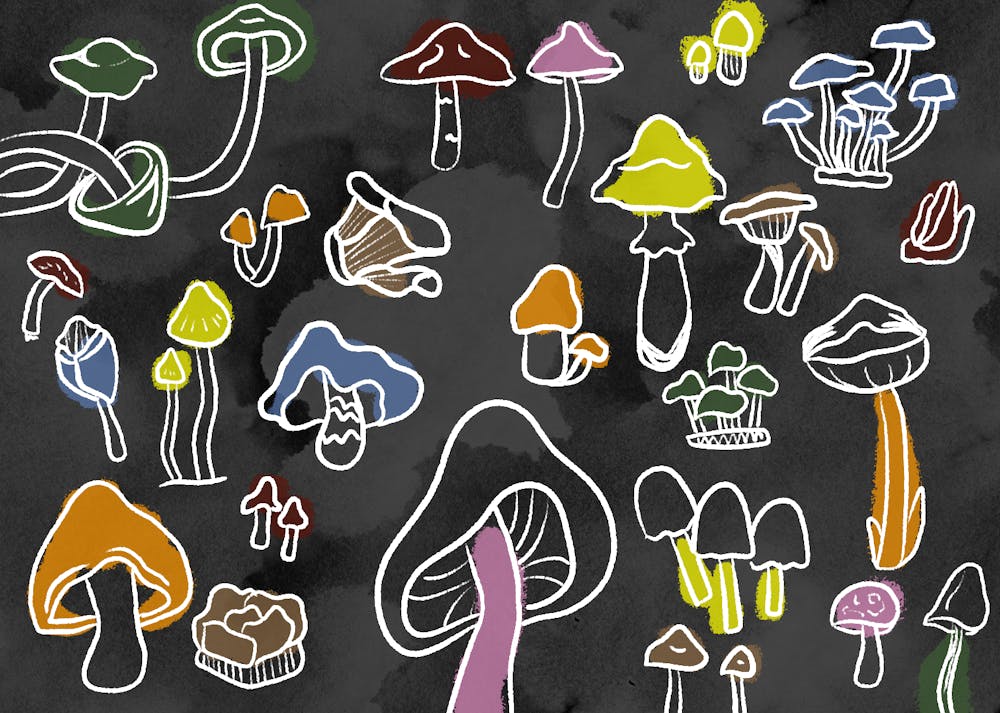The Shroom Society at ASU pulled back the curtain on the magic behind growing edible mushrooms at an event on Oct. 2.
The club has run this event for the past two years, as a partnership with Symbiotic Farms, a local growing culture organization. Clinton White, the owner of Symbiotic Farms, provided supplies to grow a mushroom and presented information about the process.
"These grow kits, in specific, are edible," said Alycia Butler, president of the Shroom Society and a junior studying psychology. "(White) basically teaches us about the substrate and then we inject them with actual cultures. He teaches us to care for them."
READ MORE: The Shroom Society at ASU looks to educate students on fungi
Attendees of the event were provided two bags when they arrived. One contained 600 grams of straw pellets and the other a hydrated and sterilized pearl oyster mushroom that was already growing and fully colonized.
Following a presentation, attendees lined up and hydrated the pellet bags. After the bag was hydrated, it was sterilized using hydrogen peroxide to prevent other bacteria from contaminating the mushroom cultures, which is the base of the mushroom. Lastly, students injected the hydrated and sterilized pellets with the pearl oyster mushroom.
Pearl oyster mushrooms are some of the most common edible mushrooms and can be found in farmer’s markets and supermarkets across the country. The mushroom is used in a variety of dishes and grow well indoors.
"As the hydrogen peroxide breaks down, it becomes oxygen and water, the two things mushrooms need," White said. "You essentially flash sterilize the inside of the bag with the hydrogen peroxide, while simultaneously hydrating the pellets."
Once the initial process was complete not much further care is required. Aric Collins, a freshman studying computer science and a member of the Shroom Society, has grown mushrooms in the past.
"With mushrooms, it’s just spores," Collins said. "You put it in a syringe and pour it over some dirt. I remember I just watered it and kept it cool."
To grow properly after the original injection the mushrooms need to be stored in a moist place without direct sunlight. The storage bags provide the mushrooms with oxygen and have vents to filter out unwanted mold or bacteria to keep the plant healthy.
"For the bags, like the ones we make here today, you’re gonna take them home and essentially let them sit in a cabinet away from the light," White said.
The full growth time varies, but the mushrooms are usually edible after nearly two months. According to White, the optimal hydration percentage for the bags is from 50-60%.
"You have to mist them frequently," Butler said. "Like two to three times a day."
READ MORE: 'Fun guy' Jake Plummer promotes mushrooms at ASU Shroom Symposium
Edible mushroom growing is just one of the many mushroom related activities the Shroom Society participates in throughout the year.
The organization also hosts workshops about mushroom safety to teach students about the difference between edible and poisonous mushrooms, go on mushroom foraging hikes, host tie dye events and more.
"We don’t know very much about mushrooms," Collins said. "They can benefit us in so many ways and it’s just informing yourself honestly."
Edited by Senna James, Sophia Ramirez and Alexis Heichman.
Reach the reporter at allipper@asu.edu and follow @lippert_audrey on X.
Like The State Press on Facebook and follow @statepress on X
Audrey is a sophomore studying journalism and mass communication with a minor in Spanish. This is her first semester with The State Press. She has also worked at Blaze Radio.




